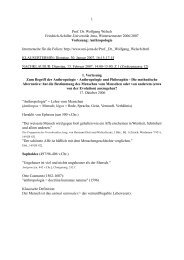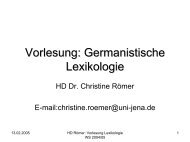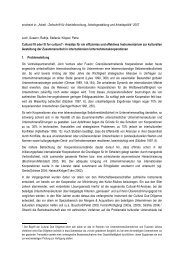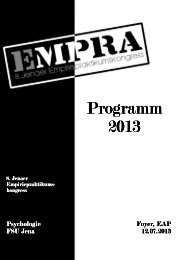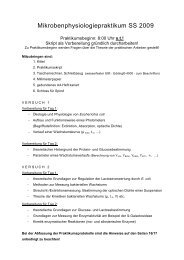Die Rolle der Umwelt in der Entwicklungspsychologie Martin ...
Die Rolle der Umwelt in der Entwicklungspsychologie Martin ...
Die Rolle der Umwelt in der Entwicklungspsychologie Martin ...
Sie wollen auch ein ePaper? Erhöhen Sie die Reichweite Ihrer Titel.
YUMPU macht aus Druck-PDFs automatisch weboptimierte ePaper, die Google liebt.
Coll<strong>in</strong>s, W.A., Maccoby, E.E., Ste<strong>in</strong>berg, L., Hether<strong>in</strong>gton, E.M., & Bornste<strong>in</strong>, M.H. (2000).<br />
Contemporary research on parent<strong>in</strong>g: The case for nature and nurture. American<br />
Psychologist, 55, 218-232<br />
Conger, K.J., Rueter, M.A. & Conger, R.D. (2000). The role of economic pressure <strong>in</strong> the lives<br />
of parents and their adolescents: The family stress model. In L.J. Crockett & R.K.<br />
Silbereisen (Eds.), Negotiat<strong>in</strong>g adolescence <strong>in</strong> times of social change (pp. 201-223).<br />
Cambridge: Cambridge University Press.<br />
Coon, H., Fulkner, D.W., DeFries, J.C. & Plom<strong>in</strong>, R. (1990). Home environment and<br />
cognitive ability of 7-year-old children <strong>in</strong> the Colorado Adoption Project: Genetic and<br />
environmental etiologies. Developmental Psychology, 26, 459-468.<br />
Deater-Deckard, K. (2000). Parent<strong>in</strong>g and child behavioral adjustment <strong>in</strong> early childhood: A<br />
quantitative genetic approach to study<strong>in</strong>g family processes. Child Development, 71,<br />
468-484.<br />
Deater-Deckard, K. & Mayr, U. (2005). Cognitive change <strong>in</strong> ag<strong>in</strong>g: identify<strong>in</strong>g geneenvironment<br />
correlation and nonshared environment mechanism. Journal of<br />
Gerontology, 60B (Special Issue I), 24-31.<br />
Eccles, J.S., Midgley, C., Wigfield, A., Buchanan, C.M., Reuman, D. & MacIver, D. (1993).<br />
Development dur<strong>in</strong>g adolescence: The impact of stage-environment fit on young<br />
adolescents' experiences <strong>in</strong> schools and <strong>in</strong> families. American Psychologist, 48, 90-101.<br />
El<strong>der</strong>, G.H. & Caspi, A. (1992). Study<strong>in</strong>g lives <strong>in</strong> a chang<strong>in</strong>g society: Sociological and<br />
personological explorations. In R.A. Zucker, A.I. Rab<strong>in</strong>, J. Aronoff & S. Frank (Eds.).<br />
Personality structure <strong>in</strong> the life course (pp. 276-322). New York: Spr<strong>in</strong>ger.<br />
Elliott, D.S. & Menard, S. (1996). Del<strong>in</strong>quent friends and del<strong>in</strong>quent behavior: Temporal and<br />
developmental patterns. In J.D. Hawk<strong>in</strong>s (Ed.), Del<strong>in</strong>quency and crime: Current theories<br />
(pp. 28-67). New York: Cambridge University Press.<br />
Ennemoser, M., Schiffer, K., Re<strong>in</strong>sch, C. & Schnei<strong>der</strong>, W. (2003). Fernsehkonsum und die<br />
Entwicklung von Sprach- und Lesekompetenzen im frühen Grundschulalter. E<strong>in</strong>e<br />
empirische Überprüfung <strong>der</strong> SÖS-Ma<strong>in</strong>stream<strong>in</strong>g-Hypothese. Zeitschrift für<br />
<strong>Entwicklungspsychologie</strong> und Pädagogische Psychologie, 35, 12-26.<br />
Evans, G.W., Gonnella, C., Marcynszyn, L.A., Gentile, L. & Salpekar, N. (2005). The role of<br />
chaos <strong>in</strong> poverty and children’s adjustment. Psychological Science, 16, 560-565.<br />
Field, T. (1998). Maternal depression effects on <strong>in</strong>fants and early <strong>in</strong>terventions. Preventive<br />
Medic<strong>in</strong>e, 27, 200-203.<br />
Fisch, S.M. (2004). Children's learn<strong>in</strong>g from educational television: Sesame Street and<br />
47



